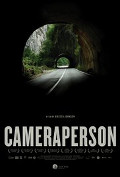
Directed by
Kirsten Johnson
102 minutes
Rated M
Reviewed by
Bernard Hemingway

Cameraperson
Synopsis: For the past twenty-five years Kirsten Johnson has worked as a camera operator or cinematographer on more than fifty documentary films. Here she assembles footage from her career into a visual “memoir”.
Kirsten Johnson opens her film with a title card that says: “These are the images that have marked me and leave me wondering still” (and adds “Love KJ” but that’s another matter) and then leaves us with a compile of footage from the many documentary films she has been involved with during her career as a “cameraperson”. The trouble is she never tells us why or how these images have marked her and continue to do so. Even the title of her film suggests that we will get some insight into the history and implications (as a real memoir would) of the footage she has shot but instead we are left to the accidentals of their source whether they have any accompanying verbal explication. We hear Johnson's voice every now and then, as when she prompts her Alzheimer’s-dazed mother but it is entirely internal to the visuals not a commentary on it. The effect is rather like going to a restaurant and being told “here’s the ingredients and there’s the pots and pan, now you do what you want with them”. It’s just not good enough.
Well perhaps it is in some quarters as the critical reception for the film in its homeland has been overwhelmingly enthusiastic. A.O. Scott of the New York Times calls it “transfixing" and suggests that:: “A philosopher — Jacques Derrida, say…might wax eloquent on the dialectical interpenetration of presence and absence”. But then it’s no accident that Derrida actually appears briefly in Johnston’s film. Why? One might well ask. Does the image of him crossing the street “mark” her or is it that his image serves to endow her film with the correct aura for that look-at-me school of critics for whom the poverty of the work serves as a clarion call for their transmutative eloquence (just as the presence of the briefly appearing Michael Moore signifies her bona fides as a documentarian).
Which is not to say that there is not interesting material here. Johnston takes us to many of the world’s trouble spots among which are Yemen, Afghanistan, Rwanda, and quite extensively, Bosnia, as well as into her own family’s lives. But she never attempts to tie her various experiences into a statement of faith or reflection on the human or, even her own, condition.
Late in the film she includes footage of a Syrian documentary-maker, Charif Kiwan, speaking on the ethical implications of filming the horrors of war. He says: “We have to find a way to represent horror, to represent death respecting the golden rule – dignity”. This statement could very well serve as Johnson’s organizing theme for, very much like Werner Herzog, she has a fascination with the tragic side of life.
From sites of ethnic cleansing to a just-born Nigerian baby struggling to breathe, from the brutal murder of a black youth in Texas to Johnson's own mother wandering in an haze of Alzheimer’s, the bulk of the imagery is given over to the sadness and madness of it all. Of course we can draw our own conclusions but what we want to hear is how Johnston makes (or fails to make) sense of what she has witnessed. After all, these are her memories, not ours. Instead when she is interviewing an Afghan boy blinded in one eye by a rocket attack we hear her say: “You’re making me cry, even though I don’t understand the language”. Like the “Love KJ” already referred to, it is a borderline sententious statement from a person who has spent 25 years documenting the sort of thing that none of us wants to experience first-hand but of which we are willing to be, “voyeurs”, as Mr Kiwan, with refreshing directness, puts it. A condition in which, ironically but wrongly, Johnson leaves us.
With a more focused approach to organizing her material and a voice-over that spoke to Johnson's opening statement Cameraperson could have been a very strong film. As it is, it’s like leafing through an unknown family’s photo album - one can discern the shape of things, even build one's own narrative, but in the end it doesn’t really mean much.

Want more about this film?


Want something different?




